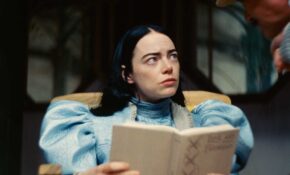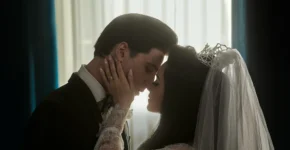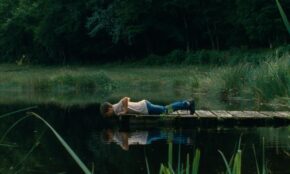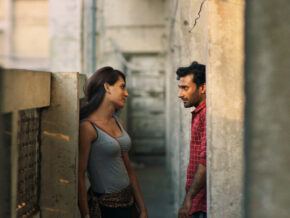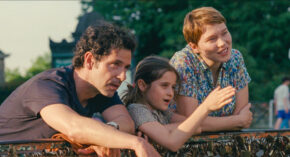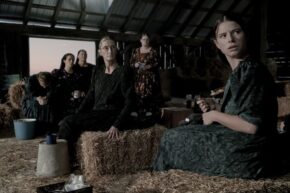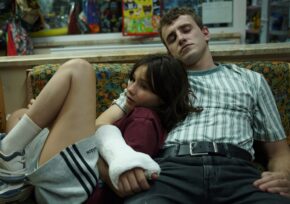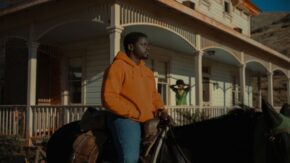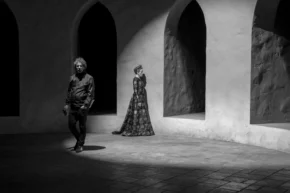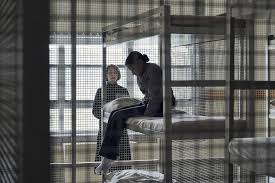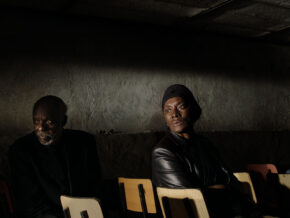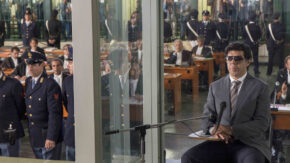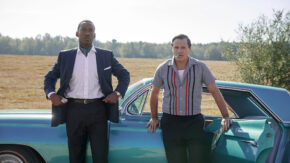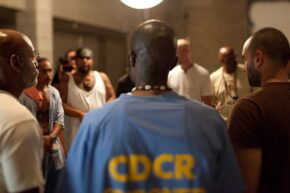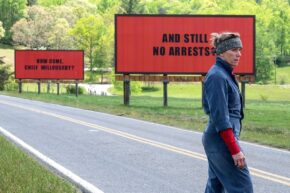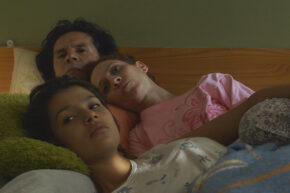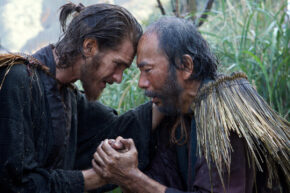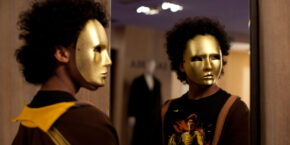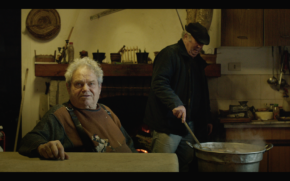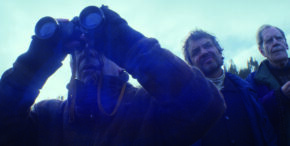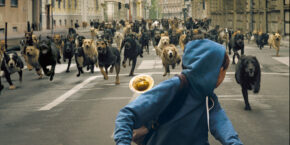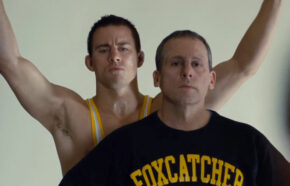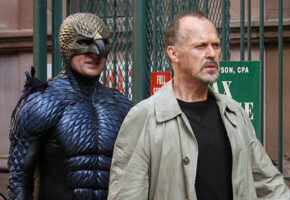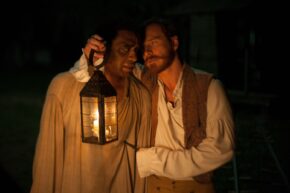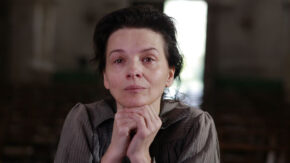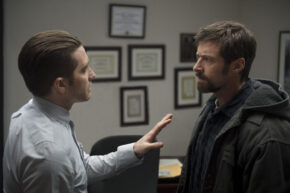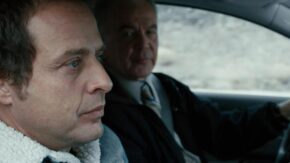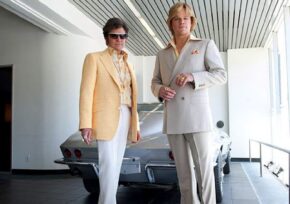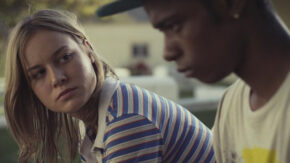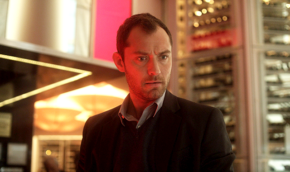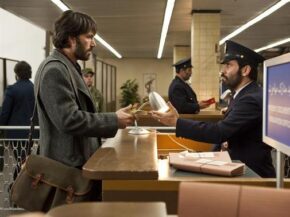Currency
The Killer (David Fincher, US)
By Adam Piron | 01/17/2024 | CS97, Currency, From Cinema Scope Magazine
Clocking in at a clean 47 seconds, the title sequence in The Killer sets something like a metronome for David Fincher’s latest effort.
Read More → Killers of the Flower Moon (Martin Scorsese, US)
By Robert Koehler | 01/17/2024 | CS97, Currency, From Cinema Scope Magazine
The extreme thoroughness, subtlety, and thought invested in this project indicate that, as Scorsese moves into his Joe Biden years, he has evolved into a more nuanced, more complex film artist.
Read More → Menus-Plaisirs – Les Troisgros (Frederick Wiseman, US)
By Jay Kuehner | 01/17/2024 | CS97, Currency, From Cinema Scope Magazine
Given the stylistic consistency yet markedly disparate subject matter of his vast oeuvre to date, it is curious to consider what, if anything, constituted the precedent for his latest film, Menus-Plaisirs – Les Troisgros, a typically protracted look at an historically family-run restaurant near Lyon.
Read More → Poor Things (Yorgos Lanthimos, US/UK/Ireland)
By Deragh Campbell | 01/17/2024 | CS97, Currency, From Cinema Scope Magazine
...the premise of Poor Things—both in Alasdair Gray’s novel and the screenplay adapted by Tony McNamara—arrives as a potentially poignant advancement of Frankenstein’s Monster.
Read More → The Practice (Martín Rejtman, Argentina/Chile/Germany/Portugal)
By Haden Guest | 01/17/2024 | CS97, Currency, From Cinema Scope Magazine
The latest film by Martín Rejtman reaffirms his singular place in Argentine and world cinema as one of the rare non-mainstream auteurs working today, with brio and invention, in the realm of comedy.
Read More → Priscilla (Sofia Coppola, US)
By Ed | 01/17/2024 | CS97, Currency
The aesthetic appeal of Sofia Coppola’s work—baby pink and pastel colours, girly make-up and cute clothes, soft lighting and trippy music—belies a deeper understanding of the condition of teenage girls, her favourite subject. For the filmmaker, these formal elements aren’t just their surface, but their very substance—the Lisbon sisters’ pink bedrooms in The Virgin Suicides (1999) are part and parcel of their identities.
Read More → TIFF 2023 | Last Summer (Catherine Breillat, France) — Special Presentations
By Madeleine Wall | 09/05/2023 | Cinema Scope Online, CS96, Currency, From Cinema Scope Magazine, TIFF 2023
This year, the ever-industrious Saïd Ben Saïd has commissioned Catherine Breillat—for the 75-year-old director’s first film since 2013’s autobiographical Abus de faiblesse—not to specifically reimagine the story of Phaedra à la her other literary adaptations, but rather to remake May el-Toukhy’s 2019 Danish film Queen of Hearts, in which a successful lawyer has an affair with her adolescent stepson.
Read More → TIFF 2023 | Mademoiselle Kenopsia (Denis Côté, Canada) — Wavelengths
By Winnie Wang | 09/05/2023 | Cinema Scope Online, CS96, Currency, From Cinema Scope Magazine, TIFF 2023
Mademoiselle Kenopsia is centrally concerned with liminality—those spaces that oscillate between familiar and surreal, enduring in transitional stasis. The dimensions of transition can be temporal, as in sun-bleached plastic jungle gyms that evoke the passage from childhood, or spatial, as in secluded motels in the middle of road trip destinations.
Read More → TIFF 2023 | Orlando, My Political Autobiography (Paul B. Preciado, France) — Wavelengths
By Holden Seidlitz | 09/05/2023 | Cinema Scope Online, CS96, Currency, From Cinema Scope Magazine, TIFF 2023
As the set is transformed in plain sight, the meta elements dissolving into a concentrated fantasy, the filmmaker’s own voice replaces the actor’s. Unseen, Paul B. Preciado asserts that, in Woolf but perhaps in general, “the first revolutionary metamorphosis is poetry,” which he defines as “the possibility of changing the names of all things.”
Read More → TIFF 2023 | Perfect Days (Wim Wenders, Japan/Germany) — Centrepiece
By Beatrice Loayza | 09/05/2023 | Cinema Scope Online, CS96, Currency, From Cinema Scope Magazine, TIFF 2023
Is Wim Wenders back? If he is, I’m not sure it’s such a good thing. Perfect Days, the tenth film by the German director to compete at Cannes, is a working-class yarn about the pleasantly banal routines of a toilet cleaner named Hirayama (Yakusho Koji), a beguiling loner with a beautiful soul who is harbouring a trauma that is never fully articulated by the film. Sound familiar?
Read More → The Adults (Dustin Guy Defa, US)
By Angelo Muredda | 06/20/2023 | CS95, Currency, From Cinema Scope Magazine
Though The Adults is at times diminished more than it’s enriched by its echoes of other texts about wayward children skulking back to their childhood home, as well as family narratives about faded talents with arrested development (including the same-named series wherein a teenaged Cera reads as precocious as he is dissipated here), the film has enough of Defa’s own peculiar, spiky tenderness to set it apart.
Read More → Astrakan (David Depesseville, France)
By Jay Kuehner | 06/20/2023 | CS95, Currency, From Cinema Scope Magazine
By Jay Kuehner The reassurance implicit in the coming-of-age story is that of things foregone, universal, known; the particularities of the passage are shorn of their severity and exigence. The subject is supposed, invariably, to have arrived, their journey ultimately delineated in retrospect. The entropy of heightened subjectivity is at last externalized and made legible.…
Read More → Joyland (Saim Sadiq, Pakistan/US)
By Saffron Maeve | 06/20/2023 | Currency, Web Only
The object impermanence of Saim Sadiq’s Pakistani drama Joyland (2022)—the story of a married young man in Lahore who falls for a trans dancer after taking up work at an erotic theatre—has a number of moving parts: the film premieres at the 75th Cannes Film Festival’s Un Certain Regard section (the first Pakistani film to do so), where it scoops up the Jury Prize and also is awarded the Queer Palm; Pakistan’s Ministry of Information and Broadcasting blocks the theatrical release, citing “highly objectionable material,” and “glamourising of transgender love affairs”
Read More → Un beau matin (Mia Hansen-Løve, France/UK/Germany)
By Holden Seidlitz | 03/24/2023 | CS94, Currency, From Cinema Scope Magazine
...there are instances where autofiction permits storytellers to forget the structural demands of narrative, a fate which befalls the French filmmaker Mia Hansen-Løve in her latest feature, Un beau matin,whose pat ending doesn’t suit her characters so much as her own memory.
Read More → Infinity Pool (Brandon Cronenberg, Canada/Croatia/Hungary)
By Saffron Maeve | 03/24/2023 | CS94, Currency, From Cinema Scope Magazine
There are few sights more imprinting than Alexander Skarsgård, nearly nude and with a silicone cap and cheek retractor, pouring himself feet-first into polychromatic sludge. He’s almost unrecognizable in his starkness, eyeballs positively juddering with fear as the room fills with liquid, all so he can elude capital punishment. As with fidelity and morals, the legalities within Brandon Cronenberg’s Infinity Pool are elastic.
Read More → All the Beauty and the Bloodshed (Laura Poitras, US)
By Haden Guest | 01/10/2023 | CS93, Currency, From Cinema Scope Magazine
the third in a series of portrait films by Laura Poitras focused on prominent activists pitched in quixotic struggle against dark forces undergirding the US as a global capitalist superpower. Unlike the divisive figures engaged by her previous features—Edward Snowden and Julian Assange—Poitras’ latest subject, Nan Goldin, could never be dismissed as a self-serving gadfly.
Read More → Women Talking (Sarah Polley, US)
By Winnie Wang | 01/10/2023 | CS93, Currency, From Cinema Scope Magazine
Sarah Polley’s adaptation of Miriam Toews’ 2018 novel Women Talking is set in a remote Mennonite community that exists out of time and under its own jurisdiction, with its own rules and superstitions. For years, the nocturnal disturbances that left local girls and women bruised and bleeding were thought to be a result of divine retribution, demons, or “female imagination”; it was later discovered that their collective nightmare was, in fact, repeated sexual assaults carried out by men armed with animal tranquillizers, many of whom were brothers, cousins, or uncles of the victims.
Read More → Aftersun (Charlotte Wells, UK/US)
By Jason Anderson | 09/26/2022 | CS92, Currency, From Cinema Scope Magazine
The image of Paul Mescal lost and losing himself in a crowded, strobe-lit dancefloor is the most haunting leitmotif in Charlotte Wells’ debut feature Aftersun, a film that would be acutely musical in feel and structure even if it weren’t powered by such a carefully curated selection of underappreciated late-’90s UK chart faves (All Saints and Chumbawamba included). As glimpsed in the flickering light, his face expresses both the loved-up chemical bliss expected of the era’s aging ravers and a more disquieting sense of vacancy; it’s as if he’s not all there. And while that phrase risks being more suggestive of some garden-variety weekender blasted
Read More → Alcarràs (Carla Simón, Spain/Italy)
By Saffron Maeve | 09/26/2022 | CS92, Currency, From Cinema Scope Magazine
By Saffron Maeve A pejorative superficially on par with its sister terms Big Pharma and Big Tech, which imply a gadgety reshaping of the natural world, Big Ag looms heavy over the sunny fields of Carla Simón’s acclaimed Alcarràs, which was awarded the Golden Bear at this year’s Berlinale and exceeded all box-office expectations upon…
Read More → Nope (Jordan Peele, US)
By Robert Koehler | 09/26/2022 | CS92, Currency, From Cinema Scope Magazine
Whatever else you may have heard about Nope, otherwise known as “Not of Planet Earth,” know this: Jordan Peele’s third and most radical movie is his subversive inquiry into Hollywood. On the surface, such a stance is old news. At least as early as Nathaniel West’s The Day of the Locust, artists who have experienced the Hollywood moviemaking business firsthand have exacted some form of literary or cinematic revenge at the beast that has fed them. The irony is that it can sometimes seem that it’s some of the most successful in the Hollywood galaxy who engage in this project, whether it be Vincente Minnelli with The Bad and the Beautiful (1952), Paul Mazursky with Alex in Wonderland (1970), or Robert Altman with The Player (1992).
Read More → Hit the Road (Panah Panahi, Iran)
By Adam Nayman | 06/21/2022 | CS91, Currency, From Cinema Scope Magazine
Many years ago, I sat down for a festival screening of an Iranian film next to another local Toronto critic whose pugnacious reputation preceded him. Unsolicited and not-so-rhetorically, he asked me if the long scenes of rural driving native to so many of that country’s arthouse exports were—and here I am quoting from memory—somehow equivalent to the action scenes in Hollywood releases. It wasn’t a serious question, of course, just a bit of sarcastic saber-rattling before the lights went down.
Read More → Everything Everywhere All at Once (Daniel Kwan and Daniel Scheinert, US)
By Angelo Muredda | 06/21/2022 | CS91, Currency, From Cinema Scope Magazine
Eager to celebrate a theatrical box-office win, Variety recently praised the success of Daniel Kwan and Daniel Scheinert’s equally moving and galling Everything Everywhere All at Once, chirping that its broad appeal beyond arthouse crowds attests not only to adult audiences’ willingness to return to theatres for the right sort of movie, but also to the fact that “ticket buyers really love the concept of a multiverse.”
Read More → Nitram (Justin Kurzel, Australia)
By Michael Sicinski | 03/21/2022 | CS90, Currency, From Cinema Scope Magazine
Shortly before the close of the 2021 Cannes Film Festival, word began to circulate that a very successful, cash-flush US distributor had snagged the rights to Nitram, the fifth feature film by Australia’s Justin Kurzel. Although the film didn’t seem to make much of an impression upon its Croisette premiere, the Spike Lee-led jury took notice of Nitram’s star, Caleb Landry Jones, giving him a somewhat unexpected Best Actor prize.
Read More → The Tale of King Crab (Alessio Rigo de Righi, Matteo Zoppis, Italy/France/Argentina)
By Jay Kuehner | 03/21/2022 | CS90, Currency, From Cinema Scope Magazine
Rigo de Righi and Matteo Zoppis expand and deflate, by slyly cinematic means, upon a tradition of racconti popolari and fiabe.
Read More → The Tragedy of Macbeth (Joel Coen, US)
By Robert Koehler | 01/04/2022 | CS89, Currency, From Cinema Scope Magazine
Why do Macbeth? As a dare, to confront the challenge of one of Shakespeare’s most problematic plays? To “beat it into submission,” as Sir Laurence Olivier once put it? To face and overcome the curse of “the Scottish Tragedy?” Kurosawa Akira came up with an original answer in Throne of Blood (1957), which was to transfer the play’s medieval Scotland setting to feudal Japan and explore its theme of the fatal hubris of ambition as a means of reflecting, 12 years after the end of the Pacific War, on the folly of Japanese imperial ambitions.
Read More → The Worst Person in the World (Joachim Trier, Norway/France/Sweden/Denmark)
By Beatrice Loayza | 01/04/2022 | CS89, Currency, From Cinema Scope Magazine
Desire tends to figure as a destructive force in the work of Joachim Trier. Anders (Anders Danielson Lie), the protagonist of Oslo, August 31 (2011), is a recovering drug addict who, by the end of the film, slips back into his old ways after a day of morale-crushing confrontations with his past.
Read More → Night Raiders (Danis Goulet, Canada/New Zealand)
By Katherine Connell | 09/20/2021 | CS88, Currency, From Cinema Scope Magazine
apocalyptic cityscape backdrops an anti-authoritarian alliance between two characters from traditional Cree stories (Wesakechak and Weetigo). Goulet’s first feature, Night Raiders, not only returns to the realm of dystopia, but also shows the degree to which its creator’s interest in the genre goes beyond the use of futuristic settings as a mere aesthetic surface.
Read More → Siberia (Abel Ferrara, Italy/Germany/Mexico/Greece/UK)
By Michael Sicinski | 06/15/2021 | CS87, Currency, From Cinema Scope Magazine
Abel Ferrara is a changed man. While the evidence suggests that this is very good news for Ferrara himself and his immediate family, it could result in a minor schism in the manner in which his films are received. For most of his career Ferrara has been the subject of a Romantic cult that glorified his legendarily self-destructive behaviour, and often read this (literal) lawlessness as an integral part of his renegade creative vision.
Read More → New Order (Michel Franco, Mexico/France)
By Adam Nayman | 06/15/2021 | CS87, Currency, From Cinema Scope Magazine
“Mexico’s upper classes are asking for trouble,” Michel Franco told Variety last fall. With New Order,trouble has found them. The deep-crimson dress selected by prosperous newlywed Marianne (Naian González Norvind) for the lavish post-wedding party at her family’s spotless steel-and-glass estate is couture at its most ominous; don’t look now, but there will be blood.
Read More → Azor (Andreas Fontana, Switzerland/France/Argentina)
By Jay Kuehner | 06/15/2021 | CS87, Currency, From Cinema Scope Magazine
Mark Twain’s quote that virtue has never been as respectable as money could easily delineate the sumptuously sordid habitat limned in Azor, except that it's precisely the kind of wisdom that the film’s wealthy habitués and their attendant financiers might invoke with complacent irony from within their insulated milieu of smoky parlours, agapanthus-lined lobbies, manicured hippodromes, and dutifully swept piscinas.
Read More → Sound of Metal (Darius Marder, US)
By Angelo Muredda | 04/05/2021 | CS86, Currency, From Cinema Scope Magazine
Entering Riz Ahmed in the disability cosplay sweepstakes as a young drummer coping with hearing loss, Darius Marder’s Sound of Metal originated as a lightly meta vehicle for husband-and-wife sludge-metal duo Jucifer to be directed by Derek Cianfrance, with whom Marder co-wrote The Place Beyond the Pines (2012). That the final result is more surprising than the rote uplift narrative suggested by its edifying logline is a testament to both Ahmed’s cagey intensity...
Read More → A Glitch in the Matrix (Rodney Ascher, US)
By Gabrielle Marceau | 03/25/2021 | CS86, Currency, From Cinema Scope Magazine
In 1977, Philip K. Dick gave a speech titled “If You Find This World Bad, You Should See Some of the Others,” in which he revealed that many of his dystopian novels weren’t the products of his imagination or dreams, but came from recovered memories of actual alternate worlds. Dick was entirely sincere, and this realization plagued him. Footage of this speech (and of Dick’s skeptical French audience) punctuate Rodney Ascher’s A Glitch in the Matrix, which explores the psychological and cultural impacts of that moment when science fiction seeps into our reality.
Read More → Nomadland (Chloe Zhao, US)
By Robert Koehler | 12/22/2020 | CS85, Currency, From Cinema Scope Magazine
By Robert Koehler A passage in Jessica Bruder’s book Nomadland describes the unlikely birth and hard death of the life of Empire, a mining town in northwest Nevada. “In 1923,” Bruder writes, “laborers established a tent colony on the site of what later became the town. By some accounts, Empire boasted the longest continuously operating…
Read More → Hillbilly Elegy (Ron Howard, US)
By Darren Hughes | 12/22/2020 | CS85, Currency, From Cinema Scope Magazine
By Darren Hughes In his 1892 inaugural address, governor William MacCorkle warned that in the coming years West Virginia would find itself occupying the same “position of vassalage” that Ireland held in relation to England, and for similar reasons: “But the men who today are purchasing the immense areas of the most valuable lands in…
Read More → The Inheritance (Ephraim Asili, US)
By James Lattimer | 09/22/2020 | CS84, Currency, From Cinema Scope Magazine
The role of past insights in (still) present-day struggles is at the heart of The Inheritance, a playful, erudite, and boundary-blurring examination of what performing Black theory, literature, music, and testimony in a contemporary Philadelphia commune might set in motion.
Read More → Possessor (Brandon Cronenberg, UK/Canada)
By Mallory Andrews | 09/22/2020 | Canadiana, CS84, Currency, From Cinema Scope Magazine
If it’s true that Brandon Cronenberg sought to cheekily poke fun at his father David’s needle-phobia in his first film (Antiviral, 2011), it feels like parts of Possessor might have been engineered specifically to make my skin crawl.
Read More → Never Rarely Sometimes Always (Eliza Hittman, US)
By Courtney Duckworth | 06/23/2020 | CS83, Currency, From Cinema Scope Magazine
One May evening, I dipped into a Twitch stream in search of a fresh current. Within the weird undertow of quarantine, there is a new lustre to these live events, which mark unfixed days with a fixed hour—a dupe for the transient communion gone from cinemas that now lie empty. Some 200 of us “gathered” for a program, co-presented by Screen Slate and Electronic Arts Intermix, of short works from Cecelia Condit, a singular scrambler of feminine tropes and fairy tales since the ’80s. New to me among them was last year’s We Were Hardly More than Children, an oneiric memoir.
Read More → Blood Quantum (Jeff Barnaby, Canada)
By Mallory Andrews | 06/23/2020 | CS83, Currency, From Cinema Scope Magazine
The hook is intriguingly straightforward: in Blood Quantum, an infectious zombie disease spreads through the world, save for the residents of a Mi’kmaq community along the Québec-New Brunswick border who appear to be immune to the undeadly virus. In the post-apocalyptic remnants of their town, Sheriff Traylor (Michael Greyeyes) and his deputies guard the boundaries of their land against the violent hordes of “Zeds.”
Read More → Beanpole (Kantemir Balagov, Russia)
By Michael Sicinski | 03/20/2020 | CS82, Currency, From Cinema Scope Magazine
Kantemir Balagov’s debut feature Closeness (2017) garnered significant attention on the festival circuit, for reasons both positive and negative. Primarily a look at an insular Jewish community in a small town in the north Caucasus, the film institutes a tragedy that tests the bonds of immediate versus extended family.
Read More → And Then We Danced (Levan Akin, Sweden/Georgia/France)
By Katherine Connell | 03/20/2020 | CS82, Currency, From Cinema Scope Magazine
From drag performances to ballroom extravaganzas, booming club sequences to solitary swaying, queer cinema has often depicted moments of yearning or self-actualization through dance: think, for instance, of the erotic and essayistic function it serves in Isaac Julien’s Looking for Langston (1989),Edward and Gaveston’s spotlit slow dancing in Derek Jarman’s Edward II (1991), the adolescent hero’s furious romp through back allies and rooftops in Stephen Daldry’s Billy Elliot (2000),or the sublime hotel dance party to Rihanna’s “Diamonds” in Céline Sciamma’s Bande des filles (2014).
Read More → Jojo Rabbit (Taika Watiti, US)
By Angelo Muredda | 12/28/2019 | CS81, Currency, From Cinema Scope Magazine
By Angelo Muredda “Don’t get into the Nazi stuff,” Taika Waititi’s deadbeat dad tells his son, the eponymous protagonist of the New Zealand-born actor-writer-director’s sophomore feature Boy (2010), gesturing to a swastika he once carved into the wall of his childhood bedroom, the remnant of a reformed punk’s youthful exploits. Hindsight being 20/20, it’s almost…
Read More → Portrait de la jeune fille en feu (Céline Sciamma, France)
By Chloe Lizotte | 12/28/2019 | CS81, Currency, From Cinema Scope Magazine
By Chloe Lizotte The very title of Portrait de la jeune fille en feu seeks to pin down the unpinnable: to fix a flame in place. Céline Sciamma’s 18th-century romance centres on the innate slipperiness of condensing someone’s presence into oil on canvas, a process in which the act of rendering becomes an intimate exchange…
Read More → Invisible Life (Karim Aïnouz, Brazil)
By Katherine Connell | 12/28/2019 | CS81, Currency, Web Only
By Katherine Connell Chronicling the life of the legendary Rio de Janeiro drag performer, hustler, and street fighter, Madame Satã (2002) announced Karim Aïnouz as a filmmaker attuned to the conceptual richness and subversive potential found within liminal spaces: individuals who fluctuate between seemingly fixed identity categories, and whose fullness of life outside the social…
Read More → Cinema Scope 80: Editor’s Note
By Mark Peranson | 09/23/2019 | Columns, CS80, Currency, Festivals
Having been in Locarno at the premiere of Vitalina Varela, I can testify that every single one of the 3,000 people who remained in the Fevi for the duration of the film were overwhelmed by the power Costa’s vision, and leapt to their collective feet in standing ovation as the credits rolled. That’s just as believable a scenario as, say, a cadre of radical critics and programmers imposing their beliefs on a bunch of uneducated suckers by sheer will, which is essentially what the Variety argument implies—a bunch of suckers, mind you, that includes a jury of rather experienced filmmakers, watchers, and actors, all of whom as far as I can tell are sentient beings with brain stems unconnected to the cinephile Matrix.
Read More → Fire Will Come (Oliver Laxe, Spain/France/Luxembourg)
By Azadeh Jafari | 09/23/2019 | CS80, Currency, From Cinema Scope Magazine
By Azadeh Jafari After two films set in Morocco—You Are All Captains (2010) and the Cannes Critics Week winner Mimosas (2016)—French-born Spanish filmmaker Oliver Laxe returns to his parents’ homeland of Galicia for his third feature, Fire Will Come, which the director has called a “dry melodrama.” The narrative is certainly simple enough: a middle-aged…
Read More → The Traitor (Marco Bellocchio, Italy/France/Brazil/Germany)
By Celluloid Liberation Front | 09/23/2019 | CS80, Currency, From Cinema Scope Magazine
“The most beautiful film is our own history,” confessed Marco Bellocchio to a journalist following the release of The Traitor, after it surpassed Godzilla: King of the Monsters at the Italian box office, proving yet again that the Mafia movieis still a commodity worth investing in.
Read More → The Souvenir (Joanna Hogg, UK/US)
By Robert Koehler | 06/27/2019 | CS79, Currency, From Cinema Scope Magazine
Given the evidence of Federico Fellini’s 8½ (1963) and François Truffaut’s Day for Night (1974), time isn’t kind to moviemakers who decide to leap into autobiography: too often, such an endeavour entails rampant solipsism, a romanticization of history, and getting the practice of moviemaking (and cinema itself) entirely wrong.
Read More → The Hottest August (Brett Story, Canada/US)
By Adam Nayman | 06/27/2019 | CS79, Currency, From Cinema Scope Magazine
It is, it seems, the End of the World as We Know It. Forty-two years after R.E.M. wrote the West’s definitive apocalypse-now anthem, the song’s essentially optimistic subtext has become even more sharply double-edged; its parenthetical proviso can be interpreted as much as a sign of denial as resignation, a means of keeping any anticipatory psychic torment at bay.
Read More → Répertoire des villes disparues (Denis Côté, Canada)
By Josh Cabrita | 03/26/2019 | CS78, Currency, From Cinema Scope Magazine
To appreciate the historical scope and layered references of Denis Côté’s Répertoire des villes disparues, we would do well to begin before the film does, at a time when some of the apparitions that haunt Irénée-les-Neiges, the film’s fictional northern Québec setting, would have existed as flesh and bone.
Read More → Green Book (Peter Farrelly, US)
By Angelo Muredda | 12/21/2018 | CS77, Currency, From Cinema Scope Magazine
By Angelo Muredda There’s a handy visual metaphor for auteurist progress in the way that road-movie savant Peter Farrelly trades the shaggy-dog van that carried his heroes most of the way from Providence to Aspen in Dumb and Dumber (1994) for the sleek vintage ride in Green Book. Farrelly’s first solo project since that debut…
Read More → The Favourite (Yorgos Lanthimos, Ireland/US/UK)
By Courtney Duckworth | 12/21/2018 | CS77, Currency, From Cinema Scope Magazine
By Courtney Duckworth Yorgos Lanthimos begins and ends his scurrilous The Favourite with the susurrus of rabbits. Tricky to place, almost subliminal over the opening parade of myriad multinational financiers, the strange sounds scratch at the ear. Soon we understand: the rabbits are the odd, probably apocryphal, attendants of Queen Anne, who presided over Great…
Read More → Transit (Christian Petzold, Germany/France)
By James Lattimer | 09/28/2018 | CS76, Currency, From Cinema Scope Magazine
By James Lattimer Christian Petzold’s progressive drift away from realism gathers pace in Transit, another melodrama of impossibility and despair that unfolds in a hyper-constructed amalgam of past and present as unstable as it is seamless. Yet the deliberately unresolved tension between ’40s Marseille and today is hardly the only element of slippage in the…
Read More → The Load (Ognjen Glavonic, Serbia/France/Croatia/Iran/Qatar)
By Azadeh Jafari | 09/28/2018 | CS76, Currency, From Cinema Scope Magazine
By Azadeh Jafari The debut fiction feature by Ognjen Glavonic is the second time that the Serbian writer-director, who lived through the Yugoslav wars as a child, has explored the same shocking incident from the time of the Kosovo conflict. In his feature-length documentary Depth Two (2016), he mixed spoken testimonies from those involved with…
Read More → The Rider (Chloé Zhao, US)
By Chelsea Phillips-Carr | 07/02/2018 | CS75, Currency
By Chelsea Phillips-Carr Having worked with horses his whole life and without any other means to make a living, Brady Blackburn (Brady Jandreau) is left without his passion and his livelihood after he incurs a head injury during a rodeo. His shaved head gleaming with bloody staples, Brady subsists on a cocktail of pills during his…
Read More → The Work (Jairus McLeary & Gethin Aldous, US)
By Manuela Lazic | 03/16/2018 | CS74, Currency, From Cinema Scope Magazine
By Manuela Lazic Early on in The Work, a documentary chronicling intense group therapy techniques practiced inside Folsom State Prison outside of Sacramento, California, a man suffers a violent meltdown. He is Brian, one of three outside visitors that directors Jairus McLeary and Gethin Aldous follow as they join inmates over a four-day course of…
Read More → Visages villages (Agnès Varda & JR, France)
By Erika Balsom | 03/16/2018 | CS74, Currency, From Cinema Scope Magazine
By Erika Balsom The Normandy village of Pirou-Plage almost became a holiday destination. In 1990, property developer Pier Invest launched a plan to build a hotel, two tennis courts, and 80 vacation homes. The initiative would transform the built environment and economy of this seaside area of 1,500 inhabitants—but not as anticipated or desired. Within…
Read More → Phantom Thread (Paul Thomas Anderson, US)
By Robert Koehler | 12/19/2017 | CS73, Currency, From Cinema Scope Magazine
By Robert Koehler SoCal being SoCal, it’s hard to leave it, especially if you were born there. The only good joke in Beatriz at Dinner has someone cracking wise about living in Newport Beach and the problem of going on vacation: Where do you go, since the best weather is here? People who don’t know…
Read More → Three Billboards Outside Ebbing, Missouri (Martin McDonagh, UK/US)
By Angelo Muredda | 12/19/2017 | CS73, Currency, From Cinema Scope Magazine
By Angelo Muredda There’s a moment early in Martin McDonagh’s Three Billboards Outside Ebbing, Missouri that neatly encapsulates the playwright-turned-filmmaker’s competing instincts toward moral sophistication and childish self-indulgence. As the bereaved protagonist Mildred Hayes (Frances McDormand) struts through the local sign shop—the first step in her campaign to use the title’s eponymous placards to shame…
Read More → Ex Libris – The New York Public Library (Frederick Wiseman, US)
By Tom Charity | 09/28/2017 | CS72, Currency, From Cinema Scope Magazine
By Tom Charity Let’s start with this: the transitions in Fred Wiseman’s new film (and there are many) have a simple and specific beauty. They double as establishing shots, each comprising a brief cluster of New York street views, usually including an intersection sign to pin us to one of the 88 branches in…
Read More → Did You Wonder Who Fired the Gun? (Travis Wilkerson, US)
By Celluloid Liberation Front | 09/28/2017 | CS72, Currency, From Cinema Scope Magazine
By Celluloid Liberation Front Throughout his artistic militancy, Travis Wilkerson has rooted his praxis in a confrontational understanding of American history and, most crucially, in the reactivation of its repressed radical passages. From the margins of the film industry, Wilkerson has frontally challenged its dominant procedures and manifestations. In his pamphlet-like films, political invectives of…
Read More → Mañana a esta hora (Lina Rodriguez, Canada)
By Angelo Muredda | 09/28/2017 | Currency, Web Only
By Angelo Muredda The first image we see in Lina Rodriguez’s deceptively modest second feature Mañana a esta hora (This Time Tomorrow) is something of a puzzle: a gradually lightening shot of a tree in a leafy park in Bogotá, standing sturdy and still. While this depopulated, evergreen overture might seem to promise an…
Read More → Araby (Affonso Uchôa and João Dumans, Brazil)
By Jay Kuehner | 06/23/2017 | CS71, Currency, From Cinema Scope Magazine
By Jay Kuehner An epistolic ode to labour, love, and life on the road, Affonso Uchôa and João Dumans’ Araby opens with a seemingly innocuous sequence that belies its ambition: teenage Andre (Murilo Caliari) pedalling his bike on a mountain road in the southern Brazilian state of Minas Gerais, a Townes Van Zandt song on…
Read More → Silence (Martin Scorsese, US/Taiwan/Mexico)
By Andrew Tracy | 03/24/2017 | CS70, Currency, From Cinema Scope Magazine
By Andrew Tracy Silence is Martin Scorsese’s best film in 20 years—since Kundun (1997), in fact, which also happens to be the last of his films to focus primarily on matters spiritual. In claiming this, I have no desire to put forth a return-to-form narrative to counter that of the Scorsese acolytes, for whom the…
Read More → Jackie (Pablo Larraín, US/UK/France)
By Adam Nayman | 12/19/2016 | CS69, Currency
By Adam Nayman In In the Line of Fire (1993), John Malkovich’s crack-shot-slash-crackpot gets off a wickedly funny line about JFK, gloating that the 35th Commander-in-Chief’s favourite poem was Alan Seeger’s “I Have a Rendezvous with Death,” which, he adds, “is not a good poem.” It’s a bad-taste joke touching on the verboten notion that…
Read More → Snowden (Oliver Stone, Germany/US)
By Robert Koehler | 09/10/2016 | Cinema Scope Online, CS68, Currency, From Cinema Scope Magazine, TIFF 2016
By Robert Koehler If Snowden, director Oliver Stone and screenwriter Kieran Fitzgerald’s version of the Edward Snowden affair, is remembered for anything, it will be as the first Hollywood movie that turned Barack Obama into a bad guy. Time was, back in the day when Obama walked on water, there was a thing you could…
Read More → Daughters of the Dust (Julie Dash, US)
By Steve Macfarlane | 09/08/2016 | Cinema Scope Online, CS68, Currency, From Cinema Scope Magazine, TIFF 2016
From Cinema Scope #68 (Fall 2016) By Steve Macfarlane It arrives as both throwaway moment and photo-historical anachronism: dozens are adorned in white on a sand dune, whiling away the hours before dusk; a girl is passed a 19th-century stereopticon, brings it to her eyes, and sees images in motion—glimpses of a city on “the…
Read More → L’Avenir (Mia Hansen-Løve, France)
By Adam Nayman | 09/07/2016 | Cinema Scope Online, CS68, Currency, From Cinema Scope Magazine, TIFF 2016
By Adam Nayman A decade after her youthful debut Tout est pardonné (2007), the now-35-year-old Mia Hansen-Løve has become a veteran. But she’s always been an old soul. Her films are rife with scenes of teenagers being forced to confront hypocrisy and loss well ahead of schedule, and she’s very good at capturing the split-seconds…
Read More → Nocturama (Bertrand Bonello, France/Germany/Belgium)
By Blake Williams | 09/06/2016 | Cinema Scope Online, CS68, Currency, From Cinema Scope Magazine, TIFF 2016
By Blake Williams To waste no time: Bertrand Bonello’s Nocturama has nothing to say about either Nick Cave or the Bad Seeds, and, more crucially, is not a film about terrorism. Perhaps a strange assertion, the latter, given that the movie spends all 130 of its sublime, stomach-churning minutes in the company of a crew…
Read More → Love & Friendship (Whit Stillman, Ireland/Netherlands/France/US)
By Alicia Fletcher Alicia Fletcher | 06/23/2016 | CS67, Currency, From Cinema Scope Magazine
By Alicia Fletcher. “Mansfield Park? You’ve got to be kidding! That’s a notoriously bad book,” asserts Tom Townsend (Edward Clements) in Whit Stillman’s Metropolitan (1990), moments before memorably declaring that he never reads novels, favouring “good literary criticism” instead (though he later relents by confessing to a mild enjoyment of Persuasion). That onscreen disparagement aside,…
Read More → Il Solengo (Alessio Rigo de Righi and Matteo Zoppis, Italy)
By Jay Kuehner | 03/21/2016 | CS66, Currency, From Cinema Scope Magazine
By Jay Kuehner The talking-head documentary, anathema to the more purposive (i.e., “show, don’t tell”) modes of nonfiction filmmaking, is revived with stubborn, prolix determination by the brood of Etruscan elders who preside over the unassuming habitat of Il Solengo. An award winner at last year’s Docslisboa, the film traces the speculative and spectral existence…
Read More → Room (Lenny Abrahamson, Ireland/Canada)
By Angelo Muredda | 12/21/2015 | CS65, Currency, From Cinema Scope Magazine
By Angelo Muredda Another awards-season thoroughbred is foaled in Room, Lenny Abrahamson’s take on Ireland-born, Canada-based Booker Prize nominee Emma Donoghue’s best-seller. For all its touchy subject matter, Room is the sort of film for which People’s Choice awards were made: a lightly conceptual, sturdily acted piece of redemptive cinema that peers into the…
Read More → Carol (Todd Haynes, US)
By Phil Coldiron | 12/21/2015 | CS65, Currency, From Cinema Scope Magazine
By Phil Coldiron It is a question of pleasure after all… Reporting from Cannes, Daniel Kasman concluded his dispatch for Mubi’s Notebook on Carol with an apparently simple question, one to which he admitted he was unable to find a satisfactory answer: “So what is at stake here?” To be certain, the stakes of Todd…
Read More → High-Rise (Ben Wheatley, UK)
By Tom Charity | 09/22/2015 | CS64, Currency, From Cinema Scope Magazine
By Tom Charity “Later, as he sat on his balcony eating the dog, Dr. Robert Laing reflected on the unusual events that had taken place within this huge apartment building during the previous three months.” That, friends, is an opening sentence: J.G. Ballard at his best. And damn if Ben Wheatley doesn’t find just the…
Read More → The Club (Pablo Larraín, Chile)
By Quintin | 09/22/2015 | CS64, Currency, From Cinema Scope Magazine
By Quintín The Club, the fourth feature by Pablo Larraín, is set in a small town in coastal Chile. There’s an unassuming house in this town that the Catholic Church runs as an open prison for priests who have committed serious crimes, sheltering them from the prying eyes of society. One priest (Father Vidal) is…
Read More → Mad Max: Fury Road (George Miller, Australia/US)
By Christoph Huber | 06/22/2015 | CS63, Currency, From Cinema Scope Magazine
By Christoph Huber “Who’d have thought 20 years ago that people would one day be nostalgic for the apocalypse?” Australian director-writer-producer George Miller mused before the release of the fourth installment of his most famous creation, which barrelled into theatres under the name Mad Max: Fury Road, showing out of competition in Cannes at the same time…
Read More → It Follows (David Robert Mitchell, US)
By Jason Anderson | 03/26/2015 | CS62, Currency, From Cinema Scope Magazine
By Jason Anderson Understandably reluctant to give a more specific appellation to the ever-morphing threat that imperils the teenage characters in his insidiously unnerving thriller It Follows, David Robert Mitchell tends to stick with “the It” in interviews. Given his second feature’s wealth of John Carpenter references, however—a heritage it shares with Adam Wingard’s The…
Read More → White God (Kornél Mundruczó, Hungary/Germany/Sweden)
By Samuel La France | 03/26/2015 | CS62, Currency, From Cinema Scope Magazine
By Samuel La France Given its spoiler-heavy advertising and the considerable word of mouth following its screenings at Cannes and Sundance and numerous festivals in between, few will see Kornél Mundruczó’s White God without advance knowledge of its climactic set piece of hundreds of dogs running riot through the streets of Budapest. It’s hardly surprising…
Read More → Burn, Hollywood, Burn: David Cronenberg’s Maps to the Stars
By Adam Nayman | 02/27/2015 | Cinema Scope Online, Currency
By Adam Nayman Back in September, when the world was young, I opined in this space that Maps to the Stars was its director’s worst movie in fifteen years. Six months later, on the eve of its American release, I’m not so sure. It’s a peculiar quality of David Cronenberg’s films that they almost…
Read More → Mann’s Fate: Michael Mann’s Blackhat
By Adam Nayman | 01/16/2015 | Cinema Scope Online, Currency
By Adam Nayman It’s a measure of Michael Mann’s self-awareness—and, all evidence to the contrary, he must have some—that over the course of Blackhat Nick Hathaway (Chris Hemsworth) gets to play at being both Hannibal Lecter and Will Graham. Introduced in manacles and prison whites with a full complement of armed guards monitoring his every…
Read More → The Babadook (Jennifer Kent, US)
By Adam Nayman | 12/18/2014 | CS61, Currency, From Cinema Scope Magazine
By Adam Nayman A semi-surprise winner of the New York Film Critics Circle’s Best First Film award, Jennifer Kent’s Sundance breakout The Babadook feels very much like a debut even as nearly everything in it is familiar. It’s a fine line between cliché and archetype, and Kent’s tale of a single mother trying to protect…
Read More → Force Majeure (Ruben Östlund, Sweden/France/Denmark/Norway)
By Angelo Muredda | 12/18/2014 | CS61, Currency, From Cinema Scope Magazine
By Angelo Muredda With all respect to David Fincher’s Gone Girl, Ruben Östlund’s Force Majeure is the best formalist black comedy about marriage since Eyes Wide Shut (1999). Inasmuch as its outline suggests an essay on the crisis of masculinity—one distilled to a defining image (emblazoned on the vaguely apocalyptic poster) of a patriarch shirking…
Read More → Inherent Vice (Paul Thomas Anderson, US)
By Blake Williams | 12/18/2014 | CS61, Currency, From Cinema Scope Magazine, Top Ten Films 2014
By Blake Williams First we see the ocean—again. Before introducing us to the hazy, neon-stroked nocturne with which Pynchon chose to open his “lite” novel, Inherent Vice—wherein Shasta materializes from a back alley to offer a fateful proposition to ex-boyfriend Larry “Doc” Sportello—Paul Thomas Anderson presents a blip of a prologue to begin his adaptation.…
Read More → Last Rites: Bennett Miller’s Foxcatcher
By Adam Nayman | 11/14/2014 | Cinema Scope Online, Currency
By Adam Nayman Early on in Foxcatcher, the eccentric and bottomlessly deep-pocketed John du Pont (Steve Carell), heir to an American munitions dynasty and a collector of expensive military gadgets, expresses his frustration about the indifference afforded to young men who’ve served their country overseas. That the veteran in question is a wrestler rather than…
Read More → Easy Virtue: Alejandro González Iñárritu’s Birdman
By Angelo Muredda | 10/24/2014 | Cinema Scope Online, Currency
By Angelo Muredda What could be a more appropriate fate for Alejandro González Iñárritu’s Birdman or (The Unexpected Virtue of Ignorance)—a slick film about a disgruntled director baring his soul and guts for unfeeling audiences and critics alike—than its doubtlessly smooth course to award-season glory? While the film is ostensibly an angry manifesto stumping for…
Read More → Pursuits of Happiness: David Fincher’s Gone Girl
By Adam Nayman | 10/02/2014 | Cinema Scope Online, Currency
By Adam Nayman [MAJOR SPOILERS ahead] Lest anybody doubt that Gone Girl is a comedy, consider that it includes, in no particular order: a scene where America’s favourite bad actor Ben Affleck is coached on his line readings by a character played by a well-known Hollywood film director (Tyler Perry); that his punishment for uninspired…
Read More → 20,000 Days on Earth (Iain Forsyth and Jane Pollard, UK)
By Angelo Muredda | 09/16/2014 | CS60, Currency, From Cinema Scope Magazine
By Angelo Muredda “Songwriting is about counterpoint,” Nick Cave insists early in 20,000 Days on Earth, Iain Forsyth and Jane Pollard’s curious documentary slash postmodern biography of the Australian singer-songwriter and Bad Seeds frontman; you put two disparate images beside each other, he explains, and see which way the sparks fly. That Cave’s definition of…
Read More → The Sting in the Tail: Bong Joon-ho’s Snowpiercer
By Michael Sicinski | 07/18/2014 | Cinema Scope Online, Currency
By Michael Sicinski [Note: this review contains mild spoilers.] In his most recent film with Sophie Fiennes, The Pervert’s Guide to Ideology (2012), Slavoj Žižek pauses to diagnose the seemingly endless spate of apocalyptic films in recent years. His analysis, brief though it may be, points the way toward an understanding of cinema’s role in…
Read More → Karlovy Vary International Film Festival | Escape Artists: Bird People and Locke
By Adam Nayman | 07/11/2014 | Cinema Scope Online, Currency, Festivals
By Adam Nayman A film seemingly made to be screened at film festivals, where its scenes of characters logging into hotel wi-fi on their laptops and thrashing around in the throes of jetlag will pack an affective punch (for journalists, at least), Bird People has divided critics as neatly as its own bifurcated, his-and-hers…
Read More → Stop the Pounding Heart (Roberto Minervini, USA/Italy/Belgium
By Jay Kuehner | 06/25/2014 | CS59, Currency, From Cinema Scope Magazine
By Jay Kuehner Faith, so often deployed as narrative substance, is a phenomenon (or noumenon) that’s difficult to represent with film. It is often reduced to milieu, mood, or mere matter: think transcendental styles and stylized transcendance, either abstractly implied or imposed in formulary fashion (Bresson’s ascetic methodology vis-à-vis Malick’s metaphysical morass). A character either…
Read More → Sing Your Life: Matthew Porterfield’s I Used to Be Darker
By Adam Nayman | 05/09/2014 | Cinema Scope Online, Currency
By Adam Nayman If Matt Porterfield were a basketball player, he’d be the skinny two-guard who curls stealthily off of screens and puts up quality shots, who you don’t even notice has eighteen points until it shows up in the box score. What I’m saying is that the 36-year-old Baltimore native is skilled in a…
Read More → Under the Skin (Jonathan Glazer, UK)
By Blake Williams | 03/20/2014 | CS58, Currency, From Cinema Scope Magazine
By Blake Williams In their attempt to adapt of one of those ornery “unfilmable” novels to the big screen, Charlie Kaufman and Spike Jonze transformed Susan Orlean’s The Orchid Thief into a meta-satire on film adaptations called, appropriately, Adaptation (2002). Following a short prologue in which Kaufman (played by Nicolas Cage) is shown being shooed…
Read More → The Grand Budapest Hotel (Wes Anderson, US/Germany)
By Julian Carrington | 03/20/2014 | CS58, Currency, From Cinema Scope Magazine
By Julian Carrington. “Let’s make an agreement,” declares Anjelica Huston’s estranged matriarch to her trio of wayward sons in the penultimate scene of The Darjeeling Limited (2007): “We’ll stop feeling sorry for ourselves. It’s not very attractive.” Following the downbeat double-header of Darjeeling and The Life Aquatic with Steve Zissou (2004)—which had seen cinema’s most…
Read More → Persona Non Grata: Lars von Trier’s Nymphomaniac
By Michael Sicinski | 03/18/2014 | Cinema Scope Online, Currency
By Michael Sicinski [Note: This review contains SPOILERS.] A few technical notes as we begin to talk about Lars von Trier’s latest film: 1) For the purposes of this discussion, I will refer to Nymphomaniac as a single work, rather than treating its two-volume release as an integral part of its construction. 2) I will…
Read More → Indistinct Chatter in Arabic: Jehane Noujaim’s The Square
By Michael Sicinski | 03/01/2014 | Cinema Scope Online, Currency
By Michael Sicinski When compared to its fellow Academy Award nominee The Act of Killing (2013), Joshua Oppenheimer’s supposedly radical examination of memory, myth, and representation in the construction of historical meaning, The Square probably comes across as reflecting a more conventional approach to documentary filmmaking. Its title, of course, refers to Tahrir Square, the…
Read More → Fake Empire: Martin Scorsese’s The Wolf of Wall Street
By Adam Cook | 01/06/2014 | Cinema Scope Online, Currency
By Adam Cook Based on the memoirs of ’90s stock swindler Jordan Belfort—whose investment firm cum criminal enterprise Stratton Oakmont made him a multi-millionaire by the age of 26, and resulted in investor losses of over $200 million by the time he was sent to prison for fraud and money laundering in 1998—Martin Scorsese’s The…
Read More → Death of a Sailsman: J.C. Chandor’s All Is Lost
By Adam Nayman | 12/13/2013 | Cinema Scope Online, Currency
By Adam Nayman Robert Redford dies at the end of All Is Lost. This is not, strictly speaking, a spoiler, as the climax of J.C. Chandor’s sophomore feature is calculatedly ambiguous—an existential Choose Your Own Adventure, if you will. The final image of Redford’s unnamed seaman reaching out to grasp the outstretched hand of an…
Read More → 12 Years a Slave (Steve McQueen, US/UK)
By Julian Carrington | 12/13/2013 | CS57, Currency, From Cinema Scope Magazine
By Julian Carrington Despite frequent disclaimers that Steve McQueen’s 12 Years a Slave is “difficult to watch,” the reverence that has greeted the film’s theatrical release speaks to its essentially and calculatedly benign character. There can be few clearer indications of the film’s eminent palatability than its garnering of the audience award at this year’s…
Read More → Inside Llewyn Davis (Joel and Ethan Coen, US)
By Adam Nayman | 12/13/2013 | CS57, Currency, From Cinema Scope Magazine
By Adam Nayman For a pair of authentically brand-name filmmakers, Joel and Ethan Coen have a funny thing for pseudonyms and noms de plume. It’s common knowledge that they’ve edited all of their productions (and been nominated for multiple Oscars) under the assumed identity of “Roderick Jaynes,” and the films themselves are filled with examples…
Read More → Victory Lap: Alexander Payne’s Nebraska
By Adam Nayman | 11/22/2013 | Cinema Scope Online, Currency
By Adam Nayman Alexander Payne’s Nebraska is a mechanical movie, and the machine it resembles is a duck press—an old-fashioned device, but darned if it doesn’t squeeze something out in the end. Such moist entreaties have been the director’s stock-in-trade since the smiling-through-tears conclusion of About Schmidt (2004), a road movie that cast Jack Nicholson…
Read More → A Sculpted Homily: Bruno Dumont’s Camille Claudel 1915
By Michael Sicinski | 10/20/2013 | Cinema Scope Online, Currency
By Michael Sicinski Not long after the release of Bruno Dumont’s third film, his infamous American folly Twentynine Palms (2003), James Quandt published his equally infamous polemic against the “New French Extremity” in the February 2004 issue of Artforum, where he placed Dumont on the naughty list right alongside Catherine Breillat, Gaspar Noé, and Philippe…
Read More → Ladies and Gentlemen, We Are Floating in Space: Alfonso Cuarón’s Gravity
By Adam Nayman | 10/04/2013 | Cinema Scope Online, Currency
By Adam Nayman [SPOILERS, as they say, below.] In space, apparently, no one can hear you scream “Cut!” That’s the sensibility of Alfonso Cuarón’s Gravity, which unravels its tale of two astronauts stranded outside their damaged shuttle in a series of gossamer-glossy long takes, with perilously dangling (digital) camera movements courtesy Cuarón’s house DP Emmanuel…
Read More → Buried Child: Denis Villeneuve’s Prisoners
By Michael Nordine | 09/27/2013 | Cinema Scope Online, Currency
By Michael Nordine It’s abundantly clear from very early on in Denis Villeneuve’s Prisoners that rough-hewn carpenter Keller Dover (Hugh Jackman) is something of a survivalist: his basement is full of worst-case-scenario provisions, he repeats his father’s “Be Ready” mantra to his teenage son, and recites the Lord’s Prayer while the boy shoots a deer…
Read More → This Is Martin Bonner (Chad Hartigan, US)
By Cinema Scope | 09/15/2013 | Currency, Web Only
By Calum Marsh Chad Hartigan’s This Is Martin Bonner tells a simple story: two fiftysomething men develop what can only be described, in clichéd trailer-speak, as an unlikely friendship. Thankfully this proves less precious than it sounds. Its men are serious, world-weary, and inhabited so naturally by their performers that they seem to carry the…
Read More → Terrible Beauty: Yonah Lewis and Calvin Thomas’ The Oxbow Cure
By Jason Anderson | 08/22/2013 | Cinema Scope Online, Currency
By Jason Anderson Though feelings of fear and pain are palpable in almost every moment of The Oxbow Cure, a curious sense of exhilaration cuts through the frigid dead. Maybe that’s due to the co-directors’ Yonah Lewis and Calvin Thomas’ possible realization that they’ve managed to do something uncommonly brave within a Canadian system that…
Read More → The Talented Mr. Allen: Woody Allen’s Blue Jasmine
By Adam Nayman | 08/02/2013 | Cinema Scope Online, Currency
By Adam Nayman Cate Blanchett’s best film performance remains her slight but crucial supporting turn in The Talented Mr. Ripley (1998). Playing Meredith Logue, a nouveau-riche heiress who has trained herself to swoon at the opera, Blanchett gently underlines this society neophyte’s would-be sophistication. The moment when she strategically nuzzles up to her date on…
Read More → Men With Guns: Thomas Vinterberg’s The Hunt
By Michael Sicinski | 07/19/2013 | Cinema Scope Online, Currency
By Michael Sicinski “You can be a one-hit wonder, so long as you make it count.” A film programmer friend of mine made this remark a few years back, regarding a particular avant-garde filmmaker who has essentially been dining out on a particular canonical entry for the past twenty-some-odd years. It’s true, no one…
Read More → Mourning in America: Ryan Coogler’s Fruitvale Station
By Adam Nayman | 07/17/2013 | Cinema Scope Online, Currency
By Adam Nayman Pulling into a gas station to fill up after a morning spent doing errands, Oscar Grant (Michael B. Jordan) witnesses a speeding car barrels over a stray dog hanging out on the curb. Startled and enraged, he chases the car halfway down the block before turning his attentions to the victim. Looking…
Read More → Behind the Candelabra (Steven Soderbergh, US)
By Jason Anderson | 06/26/2013 | CS55, Currency, From Cinema Scope Magazine
By Jason Anderson For all the delight it takes in displaying the hard, shiny surfaces of its celebrity subject’s beloved “Austrian rhinestones,” the luxury automobiles he buys on a whim, and gilded crap of every variety, Behind the Candelabra reserves its most ardent attention for a certain array of body parts. Indeed, three of them…
Read More → Short Term 12 (Destin Cretton, US)
By Kiva Reardon | 06/26/2013 | CS55, Currency, From Cinema Scope Magazine
By Kiva Reardon The title of Destin Cretton’s first feature suggested that the director knew his audience. Premiering at Sundance in 2012, I Am Not a Hipster seemed tailor-made for the festival’s indie-centric crowd: focusing on a lovesick California indie musician, the film sketched a spot-on portrait of young white male malaise, awash in scruffy…
Read More → Mud (Jeff Nichols, US)
By Andrew Tracy | 06/26/2013 | CS55, Currency, From Cinema Scope Magazine
By Andrew Tracy A ways back, in Cinema Scope’s saddle-stitched days, I speculated (à propos Eagle Pennell’s excellent The Whole Shootin’ Match [1978]) on the curious dynamic between regional and “national” (i.e., New York and Los Angeles) filmmaking in the US. The fact is that the majority of successful regional filmmakers do not remain regional…
Read More → Bauble Heads: Sofia Coppola’s The Bling Ring
By Adam Nayman | 06/20/2013 | Cinema Scope Online, Currency
By Adam Nayman Taking its title from Steely Dan’s barbed, the-kids-aren’t-alright tract “Show Biz Kids” and its plodding, piano-driven beat from Elton John’s “Benny and the Jets,” Frank Ocean’s single “Super Rich Kids” is a wasted daydream of (literally) high-living largesse (“Start my day up on the roof / There’s nothing like this kind of…
Read More → Boring Twenties: Baz Luhrmann’s The Great Gatsby
By Adam Nayman | 05/10/2013 | Cinema Scope Online, Currency
By Adam Nayman Before it’s even begun, Cannes 2013 is off to a dubious start with The Great Gatsby. Even if nobody really expected this latest version of F. Scott Fitzgerald’s epochal novel to be worthy (of an Opening Night slot or anything else), it doesn’t even manage to be outrageous. For long stretches Baz…
Read More → By the Book: Evil Dead
By Adam Nayman | 04/05/2013 | Cinema Scope Online, Currency
By Adam Nayman In Fede Alvarez’s Evil Dead—which pointedly but pointlessly drops the definite article from its title—the demonic spirit is willing and the flesh is as weak as it needs to be: not since Carter Smith’s underrated 2006 adaptation of The Ruins (or maybe Danny Boyle’s 127 Hours) has a movie focused so intently…
Read More → “No One Can Survive In That Water”: Jane Campion and Garth Davis’ Top of the Lake
By Michael Sicinski | 03/31/2013 | Cinema Scope Online, Currency
By Michael Sicinski Although the new miniseries Top of the Lake had its world premiere this past January at the Sundance Film Festival, it is darkly fortuitous that it should have its television run two months later. March has seen the emergence of details from the rape of a young woman in Steubenville, Ohio, material…
Read More → You Ain’t Seen Nothin’ Yet (Alain Resnais, France)
By Blake Williams | 03/21/2013 | CS54, Currency, From Cinema Scope Magazine
By Blake Williams That Alain Resnais would endow his follow-up to his neurologically scrambled masterpiece Les herbes folles (2009) with the title You Ain’t Seen Nothin’ Yet seems like a goad to premature eulogists. As Resnais would be turning 90 a fortnight after the film’s Cannes premiere last year, many journalists in attendance presumptuously deemed…
Read More → Django Unchained (Quentin Tarantino, US)
By Quintin | 03/21/2013 | CS54, Currency, From Cinema Scope Magazine
By Quintín In one of the first scenes of Steven Spielberg’s Lincoln (2012), a black soldier stands proudly and defiantly in front of the President and, without technically overstepping the bounds of respectfulness, argues that African-Americans (it sounds ridiculous to use that term in this context, doesn’t it?) deserve pay equal to that of white…
Read More → Passion (Brian De Palma, France/Germany)
By Andrew Tracy | 03/20/2013 | CS54, Currency, From Cinema Scope Magazine
By Andrew Tracy Allow for the possibility that perspective can trump prejudice, I suppose. Eight months after seeing Brian De Palma’s Passion and thinking it ludicrous (probably intentional) and dreadful (presumably not), I’ve since scaled it back to the former—though the fact that it isn’t dreadful does not ipso facto mean it’s any fucking good.…
Read More → And Everything Is Not Going Fine: Steven Soderbergh’s Side Effects
By Vadim Rizov | 02/12/2013 | Cinema Scope Online, Currency
By Vadim Rizov Critics arriving late to press screenings of Steven Soderbergh’s Side Effects were greeted by an unusual sign: “Dear Invited Guest, due to the non-linear nature of this film, it would be unrewarding for you to enter at this point. We look forward to welcoming you at the next screening. Best regards, The…
Read More → Fight Club: Judd Apatow’s This Is 40
By Adam Nayman | 12/21/2012 | Cinema Scope Online, Currency
By Adam Nayman When Paul Rudd declared midway through Knocked Up that marriage was like a “tense, unfunny episode of Everybody Loves Raymond,” it was meant as a warning to a friend. As it turns out, he was also offering an advance review of This Is 40. Judd Apatow’s “sort of sequel” to his career-and-industry…
Read More → Argo (Ben Affleck, US)
By Quintin | 12/16/2012 | CS53, Currency, From Cinema Scope Magazine
By Quintín Argo might be thought of as Inglourious Basterds (2009) in reverse, or at least as a reply to Quentin Tarantino’s film. While in Inglourious Basterds, cinema teaches reality how things should have worked, Argo presents an example of how things really worked with the aid of cinema. Although extracting a few hostages from…
Read More → 



